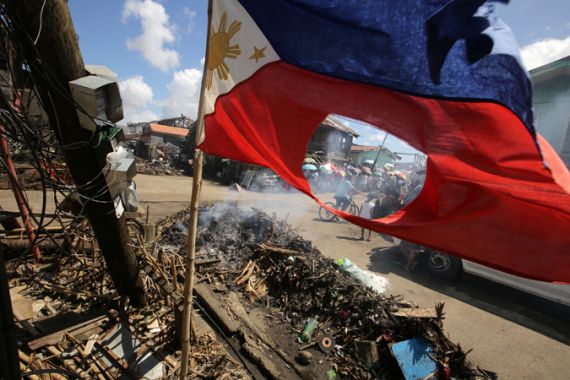From the front line of climate change to negotiators in Warsaw
As the summit on climate change draws to a close, pleas continue for wealthier nations to ‘do their moral duty’.

Tacloban, The Philippines – There was a moment I thought we were all going to die. My family and neighbours had been huddled in a 20-foot shipping container for hours, taking turns to hold the door shut against the howling wind. Our house had disintegrated around us, and now parts of it were slamming against the side of the container with terrifying crashes. The wind intensified and I felt my fingers begin to slip on the door. If it opened, we’d be sitting ducks for the debris flying through the air. I tightened my grip, and somehow I held on.
We survived Typhoon Haiyan. Thousands of others were not so lucky. I spent the next day desperately looking for survivors amid the destruction, and pulling bodies from the wreckage of their homes. You could smell them before you saw them. The school that I had helped to build here had been destroyed and for days we had nothing to drink but coconut milk. Everything I knew had gone in a single night.
Keep reading
list of 4 itemsThe Alabama town living and dying in the shadow of chemical plants
How India is racing against time to save the endangered red panda
Canada wildfires spur evacuation orders, warnings: What you need to know
Welcome to the front line of climate change. Global warming is not a nightmare of the future. I have seen it with my own eyes and felt it in my own skin. I’ve spent the past two weeks in a sort of stunned disbelief, doing what I can to help as I visit places that used to be bustling streets or friends’ houses, now reduced to enormous mounds of foul-smelling rubble.
I’m not from the Philippines, but it is my home. I moved here six years ago and I married a Filipina. Even in this short time, I’ve seen the climate changing in front of my eyes. The rains are heavier, the winds are stronger, and terrible storms roll in off the Pacific more and more often. You don’t have to be a scientist to realise that something big is happening here, something that is putting millions of people at risk.
Yeb Sano, the Philippines Climate Commissioner, has taken this messageto Warsaw, where all governments are meeting to try and get a global deal to stop climate change. I’m not going to pretend that I have followed the talks closely. But Sano’s appeal for the biggest polluter countries to keep their promises to help poorer countries vulnerable to climate change, such as the Philippines, has been on the news. He is becoming a national hero.
|
|
| Climate summit in overtime |
From where I sit, the moral imperative is clear. Rich countries produce most of the world’s pollution, which drives global temperatures on this upward trend. But then poor countries pay the highest price; drought, extreme weather, disease and destruction, and more and more Haiyans. Surely, the least these rich countries can do is to provide the funds to keep the most vulnerable safe.
The good news is that the mechanisms to help poor countries prepare for, and cope with climate change, have already been agreed upon, and rich countries had already promised they would contribute to it. But now they are reneging on their word. If the US and European countries can agree now to a plan to fill the pot, we can start preparing places like the Philippines for the onslaught that scientists predict is headed their way.
But without that leadership, we are doomed. If the whole world can learn from what has happened here, and take the urgent action that is required, then we can spark a glimmer of hope amid the despair that Haiyan has left behind.
The talks end today and I feel the urgent need to speak out and make sure the negotiators hear from those of us already suffering. If I could send a single message to the negotiators sitting in that room 6,000 miles away, it would be this: Put people before politics. Think of the lives that hang on your decisions. They are people like me, and before long they could be people like you. Above all, keep your promises to world’s poor. Is that too much to ask?
Keith Wakefield is one of Avaaz’s 30 million members.
